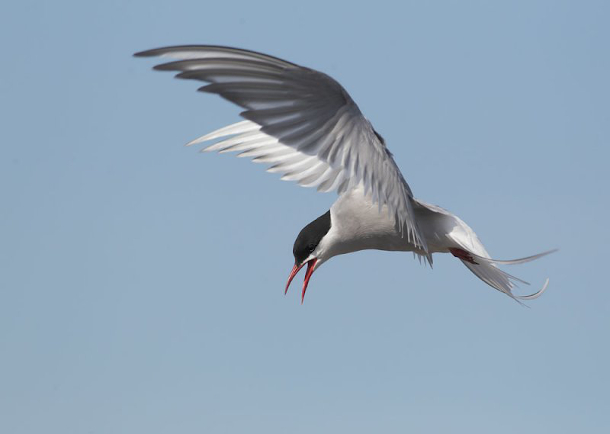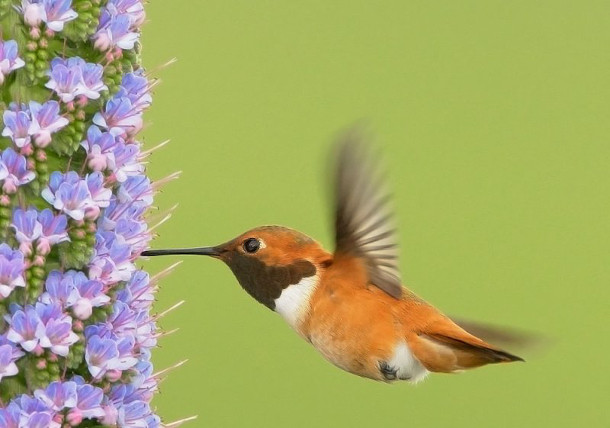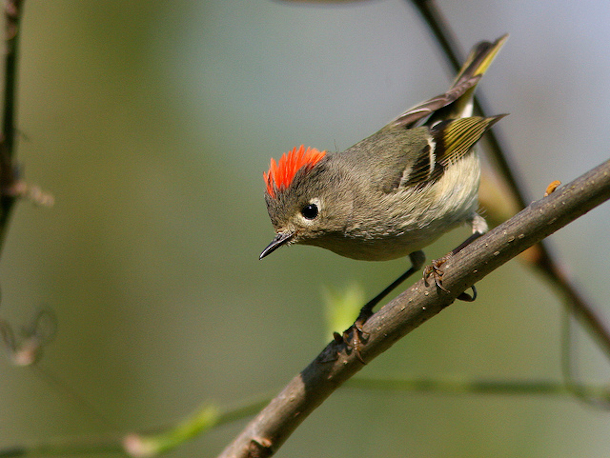BirdNote®: Migration – Long, Short, And In-Between
Air Date: Week of October 1, 2021

Arctic Terns migrate pole-to-pole each year, traveling up to 44,000 miles! (Photo: Tom Grey)
The fall harvest season is upon us and for birds that means it’s time to migrate. BirdNote®’s Mary McCann has more.
Transcript
BASCOMB: It’s Living on Earth, I’m Bobby Bascomb.
CURWOOD: And I’m Steve Curwood
The fall harvest season is upon us and for birds that means it’s time to migrate. Birdnote’s Mary McCann has more.
BirdNote®
Migration - Long, Short, and In-Between
Written by Bob Sundstrom
MCCANN: In September, Arctic Terns fly south over the ocean, from Alaska all the way to Antarctica. [Arctic Terns’ gruff calls] Also in September, the last Rufous Hummingbirds depart their breeding range in the West, following “floral highways” of mountain wildflowers south to Mexico. [Male Rufous Hummingbird wing-whistle] Ruby-crowned Kinglets are leaving the northern evergreen forests where they nest, on their way to milder climates. [Ruby-crowned Kinglet song] Each of these birds is migrating, but on a very different course. All have the same adaptive goal — making the most of food and breeding opportunities that change with the seasons. Arctic terns follow one of the longest annual migrations, traveling as much as 44,000 miles each year. Arctic tundra provides their ideal nesting site in summer, the Antarctic, the ideal feeding grounds in our winter.
[Arctic Terns’ gruff calls]
Rufous Hummingbirds are medium-range migrants, traversing about 5,000 miles a year between temperate and tropical nectar sources.
[Male Rufous Hummingbird wing-whistle]

Rufous Hummingbirds are medium-range migrants who travel about 5,000 miles a year between temperate and tropical nectar and small insect food sources. (Photo: Tom Grey)
Some Ruby-crowned Kinglets are altitudinal migrants, especially in the West. They may remain close to the same latitude all year but spend the cold months in the relative earth of the lowlands dining on insects and eggs. In summer, you’ll need to ascend thousands of feet into the western mountain ranges to hear the kinglet’s exuberant song.
[Ruby-crowned Kinglet song]

Some Ruby-crowned Kinglets are altitudinal migrants that spend the cold months in the lowlands and move up into the mountains for summer. (Photo: Kenneth Cole Schneider)
###
Bird audio provided by The Macaulay Library at the Cornell Lab of Ornithology, Ithaca, New York. Arctic Tern calls, Ruby-crowned Kinglet song and Rufous Hummingbird call recorded by G.A. Keller.
Ambient songbird track recorded by C Peterson.
BirdNote’s theme music was composed and played by Nancy Rumbel and John Kessler.
Producer: John Kessler
Executive Producer: Chris Peterson
© 2013 Tune In to Nature.org September 2013 / 2017 / 2020 Narrator: Mary McCann
ID# 091307migr3KPLU migration-07b
Arctic Tern statistics from: Berthold, Peter. Bird Migration: A General Survey. New York: Oxford University Press, 1993.
https://www.birdnote.org/listen/shows/migration-long-short-and-between
CURWOOD: For photos migrate on over to the Living on Earth website, loe.org
Links
Find this story and more on the BirdNote® website
Living on Earth wants to hear from you!
Living on Earth
62 Calef Highway, Suite 212
Lee, NH 03861
Telephone: 617-287-4121
E-mail: comments@loe.org
Newsletter [Click here]
Donate to Living on Earth!
Living on Earth is an independent media program and relies entirely on contributions from listeners and institutions supporting public service. Please donate now to preserve an independent environmental voice.
NewsletterLiving on Earth offers a weekly delivery of the show's rundown to your mailbox. Sign up for our newsletter today!
 Sailors For The Sea: Be the change you want to sea.
Sailors For The Sea: Be the change you want to sea.
 The Grantham Foundation for the Protection of the Environment: Committed to protecting and improving the health of the global environment.
The Grantham Foundation for the Protection of the Environment: Committed to protecting and improving the health of the global environment.
 Contribute to Living on Earth and receive, as our gift to you, an archival print of one of Mark Seth Lender's extraordinary wildlife photographs. Follow the link to see Mark's current collection of photographs.
Contribute to Living on Earth and receive, as our gift to you, an archival print of one of Mark Seth Lender's extraordinary wildlife photographs. Follow the link to see Mark's current collection of photographs.
 Buy a signed copy of Mark Seth Lender's book Smeagull the Seagull & support Living on Earth
Buy a signed copy of Mark Seth Lender's book Smeagull the Seagull & support Living on Earth

